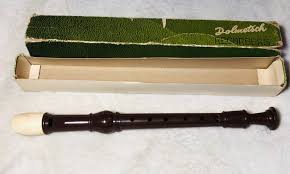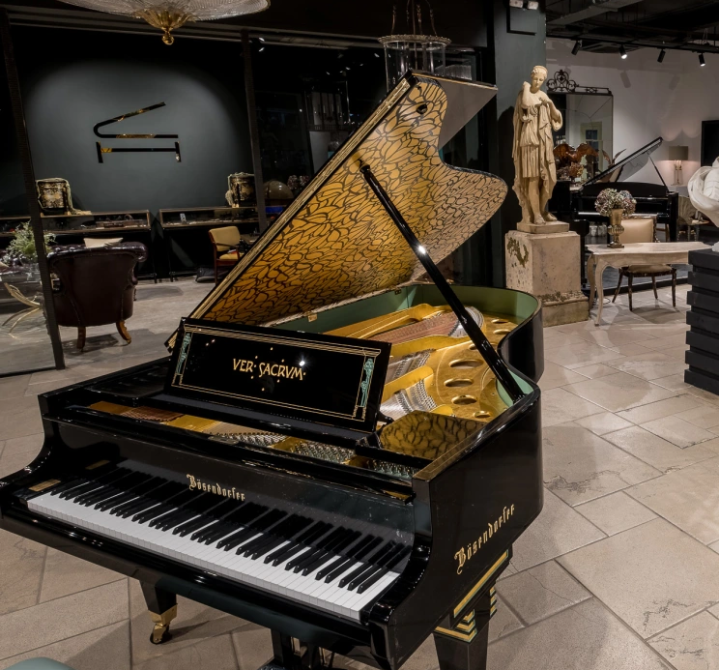It started with this tweet…..
I retweeted it because it amused me. But looking at that red cover with the simple outline of a recorder also brought a Proustian rush of memories – of about 20 children sitting in a sun-filled classroom at Maney Hill Primary School in Sutton Coldfield in the early 1970s, with the book open flat on the table in front of us, each clutching a brown plastic recorder from which we attempted to draw sweet – and often not-so-sweet – sounds!
I confess I loved the recorder. It was easy to play and portable so you could take it round to your best friend’s house and play London’s Burning or Three Blind Mice in a round together. I loved the green Dolmetsch box that the recorder arrived in, and the special fluffy cleaning device.





My interest in, and enthusiasm for the recorder was encouraged less by school recorder playing and more by my father, himself a very competent amateur clarinettist and recorder player. Our joint enthusiasm was undoubtedly helped by David Munrow, whose radio and TV programmes about early music inspired us to improve our recorder playing, explore new repertoire and different instruments too (I had a very pretty blonde wood alto recorder in addition to the treble). At the same time, I was beginning my piano studies, and I have very happy memories of making music at home, with my dad and with other recorder-playing school friends. Later, at secondary school, I was sufficiently proficient in the recorder (though I never took any grade exams) to join the Recorder Group which performed mostly Renaissance and Baroque repertoire. It was one of many fantastic musical opportunities I enjoyed at a state comprehensive school in the early 1980s: how lucky we were then!
That image of The School Recorder Book brought a flood of memories for me so I posted it on Twitter and asked people to share their own reminiscences of playing the recorder at school. The response has been incredible – I never imagined that I would “go viral” online with a post about learning the recorder (to date, the post has received over 116K views)! So many wonderful memories shared (some not so positive!) – there isn’t room to include them all here, so I will include a selection and you can read the rest via my original post.
The first person to reply was concert pianist Sir Stephen Hough with a less than positive memory:
Remember it? I’ve still got a copy (and Book 2).
Started learning at 8. At 12, went to Saturday morning local music college to play. Took Trinity College grades up to 8, then Diploma; A level music, and entered first ever BBC Young Musician (1978). And met my husband!
HEATHER
Many, many other people responded with comments about how the recorder had encouraged their interest in music, got them reading music, and led them to move on to other instruments. For some it was an important gateway into music which eventually led to a professional career in music:
Recorders are cheap for schools and parents to buy and are a great way to give children their very own musical instrument. They’re also a gateway to other instruments and a way to make notation come to life! And they can sound really good!
OLIVIA
This book laid the foundation of a joyous musical journey for many of us whose life would be so much poorer for not learning an instrument! If it was still compulsory in schools we wouldn’t be in half the mess we are!
PHIL
I learned with this at school in the early 80s, and remember my delight when the notes on the page finally matched up to my fingers and the sound I made! Went on to the next book in private lessons, took up treble, exams up to grade 8, learned tenor and bass, am still playing.
SERENA
Learning recorder in primary school was such an integral part of my musical education. We were so lucky to have a really enthusiastic head teacher who encouraged us to learn. She played classical music as we entered assembly and wrote the name of the piece on the blackboard.
MARK SIMPSON, composer & clarinettist
Flipping LOVED it – played for hours. Mum introduced me (a primary teacher who taught recorder in class w/ this book) and then I learnt with my class when I was 9/10. I’m convinced it made me a better singer (breath, phrasing etc) and nowadays a better broadcaster!
KATIE BREATHWICK Classic FM presenter
I received over 500 replies to my original tweet, and a few reminiscences by email too. I’m so grateful to everyone who shared their recorder memories, even the less savoury ones, such as recalling the taste and smell of the disinfectant in the bucket where the school recorders lived between lessons! The overriding message from all of this is that playing the recorder at school laid the foundations for a love of music, the ability to read music, the inspiration to go to learn other instruments, to teach music or to pursue a career as a performing musician (“I wanted to be Michala Petri!” declared one enthusiastic respondent to my original tweet).
Of course there is a serious side to all this ‘recorder love’. Today children learn instruments like the ukelele or ocarina at primary school and the recorder has rather fallen out of favour. Yet it’s one of the most logical, simple instruments to play and makes a pleasant sound from the get go. The reasons given for learning the ukelele are identical to those for the recorder: indeed, learning any musical instrument helps with concentration, cognition, memory, self-confidence, and a host of other valuable life skills.
Today music teaching in schools is declining at an alarming rate and recent statistics on music education make for depressing reading. Only 5,000 students in England took A level music in 2023, down 45 percent since 2010 [1]. If this downward trend continues, in less than 10 years no students in the state sector will be taking music A level, and learning music will become the preserve of the privately-educated, specialist music schools, and those who can afford private tuition. Not only does this decrease the pool of potential professional musicians and music educators, it also confirms the tired cliché that music, in particular classical music, is an elite activity. The impetus has to be from bottom up – from early years education where enthusiastic, creative teaching fosters an interest in and love of music from a young age.
Reversing the decline in music education will take sustained, collaborative efforts from a range of different organisations, partners, and funding bodies across the music sector. A diverse and thriving music sector, with a representative workforce and equal opportunities for children and young people to consider meaningful careers in music, was not built overnight. It is the work of decades of trust building with children and families and careful, considered, and consistent offering of opportunities for young people to develop their skills over many years. The best time to reverse the decline in music education and address representation issues in the music sector is not when young people reach adulthood, but during childhood.
The Day the Music Dies? Why time is running out to tackle the decline in UK music education
You can read all the responses by clicking my original tweet and scrolling down.
[1] The Day the Music Dies? Why time is running out to tackle the decline in UK music education








